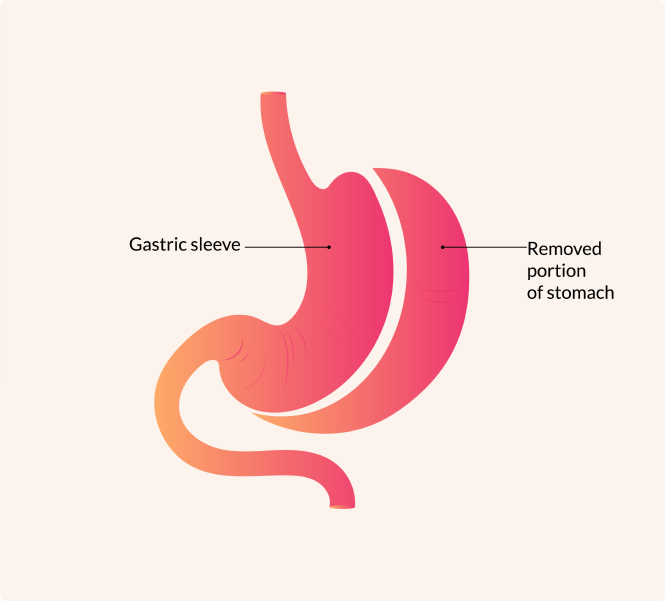What is Gastric Sleeve?
Vertical Sleeve Gastrectomy (VSG) is a restrictive surgical procedure designed to form a smaller stomach pouch, restricting the quantity of food consumed during each meal. This results in an earlier sense of fullness and a prolonged feeling of satiety. With reduced food intake, the body shifts from storing excess calories to utilizing its fat reserves for energy. The removal of a portion of the stomach contributes to a natural reduction in appetite by eliminating an area where the hunger hormone (ghrelin) is produced.
At Idaho BMI, gastric sleeve surgery is performed laparoscopically, involving only THREE small incisions and the use of a camera and specialized instruments. VSG is considered a relatively safe and effective weight-loss surgery, leading to significant and sustainable weight loss when following our specific post-operative guidelines.

Benefits
Who is a candidate for gastric sleeve?
Good candidates for vertical sleeve gastrectomy generally include individuals who:
- Have a Body Mass Index (BMI) of 40 or higher: VSG is often recommended for individuals with severe obesity.
- Have a BMI of 35 or higher with obesity-related health conditions: This may include conditions such as type 2 diabetes, high blood pressure, sleep apnea, or other obesity-related health issues.
- Have attempted and failed to lose weight through non-surgical methods: Candidates for VSG typically have a history of unsuccessful attempts at sustained weight loss through diet and exercise.
- Are committed to lifestyle changes: Successful outcomes with VSG require a commitment to long-term lifestyle changes, including dietary modifications, regular physical activity, and a change to the way you think about obesity.
- Are in good overall health: Candidates should be in good general health and be able to tolerate surgery.
- Have realistic expectations: Candidates should have a realistic understanding of the potential risks and benefits of the procedure and be mentally prepared for the significant lifestyle changes that accompany it.
“Dr. Brown is amazing. I feel like if you follow what he teaches you to do, listening and connecting to your body, weight issues can be a thing of the past.”
“The method and approach to weight loss surgery at Idaho BMI is different than anything I’ve researched or seen before. Dr. Brown has given me the tools to retrain my brain so I can maximize my success. My life has changed for the better.”
The Micro-Sleeve Gastrectomy
RISKS
What are the risks of gastric sleeve surgery?
Gastric sleeve surgery, or vertical sleeve gastrectomy (VSG), is generally considered safe and effective for weight loss; however, like any surgical procedure, it carries potential risks and complications. It’s important for individuals considering gastric sleeve surgery to be aware of these risks and discuss them thoroughly with their healthcare team. Some common risks associated with gastric sleeve surgery include:
- Infection: Any surgical procedure carries a risk of infection. This can occur at the incision sites or within the abdominal cavity.
- Bleeding: Excessive bleeding can occur during or after surgery. In some cases, additional procedures may be necessary to address bleeding.
- Leakage: A leak along the staple line or at the site where the stomach was removed can occur. This is a serious complication that may require further surgical intervention.
- Blood Clots: Blood clots can form in the legs (deep vein thrombosis) or travel to the lungs(pulmonary embolism). Measures such as blood thinners and early ambulation are often employed to reduce this risk.
- Are in good overall health: Candidates should be in good general health and be able to tolerate surgery.
- Have realistic expectations: Candidates should have a realistic understanding of the potential risks and benefits of the procedure and be mentally prepared for the significant lifestyle changes that accompany it.
- Gastroesophageal Reflux Disease (GERD): Some individuals may experience an increase in acid reflux symptoms after gastric sleeve surgery. This can usually be managed with medications, but in some cases, additional surgery may be required.
- Stricture: Narrowing of the sleeve may occur, making it difficult for food to pass through. This can be addressed with further procedures if necessary.
- Nutritional Deficiencies: Reduced stomach size can impact nutrient absorption, leading to deficiencies in vitamins and minerals. Regular monitoring and supplementation are often required.
- Unsatisfactory Weight Loss: While gastric sleeve surgery is effective for weight loss in many cases, individual outcomes can vary. Some individuals may not achieve the desired weight loss.
- Changes in Bowel Habits: Alterations in bowel habits, including diarrhea or constipation, may occur after surgery.
We operate differently.
About Idaho BMI
Idaho BMI, in partnership with Everest Surgical Institute, is committed to making bariatric surgery available to more people who need it. Because no one should ever be priced out of reaching their fullest potential.

Reprogram your brain. Redefine your future.
Ready to shed more than just doubts? Inquire now to request an appointment and discover the path to better health.

